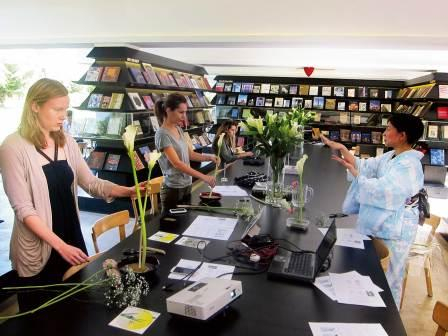
Japanese residents in the UAE nurture their ancient traditions far more fervently than their compatriots back home. Embracing ikebana, authentic Japanese food, the tea ceremony, calligraphy, karate as well as ceremonies celebrating nature’s seasons, they are determined to preserve a unique culture that dates back thousands of years.
While doing so, they promote omotenashi in such a positive way that other nationalities are equally passionate about all things Japanese. Omotenashi loosely translates as “expressing the spirit of selfless Japanese hospitality”.
“Our traditional culture is something we should be proud of,” says Harue Oki, ikebana professor and owner of Tsubaki Artisanal. She teaches ikebana and plans to open an outlet and workshop space in the UAE promoting authentic concepts from Japan along with architect Takeshi Maruyama of Takeshi Maruyama Global Design Unit. They feel there is a deep respect among Dubai residents for Japan and its traditions. But with a youth culture that is more concerned with modern fads in fashion, technology and lifestyle back home, Oki is worried.
“Almost a quarter of the population is over 65 and they are the people keeping our traditional art and craft alive. Once they are gone there will be no more and that is too sad,” she says.
However, Maruyama says, “The younger generation living outside of Japan is definitely more interested in cultivating traditional Japanese culture than those living back home.”
Matter of pride
Mai Isomura, a researcher at Sojitz Corporation, is a case in point. She taught her friends the language because they requested it. “When we are living in Japan there are few occasions to show Japanese skills to others, but once we go outside the country there are many.”
Maruyama established his company in Dubai in 2006, initially pushing a modern architectural style but when numerous Japanese hospitality professionals asked him to design their outlets in more traditional styles he returned to authentic Japanese design, such as Tomo Restaurant in Raffles Hotel.
There’s no doubt about it — every Japanese person living abroad misses the seasons. To lessen the blow, this spring Oki imported cherry blossoms (sakura) into Dubai for the first time, using them in her ikebana creations.
Multifaceted culture
Japanese Tea Ceremony Master Yasuyo Suzuki misses Mount Fuji and its springtime cherry blossoms but managed to get a glimpse this year at a cherry blossom festival held at the Junsui Restaurant in the Burj Al Arab.
The basic principles of her ancient craft, which takes decades to master, are about harmony, respect, purity and tranquillity. The mother of three says, “My heart becomes calm and purified during the tea ceremony.”
Now her life’s work, she chose this path when she was three years old because the kindergarten she attended in a Tokyo temple taught children the “way of tea”.
“By studying this ceremony, we seek to obtain an ultimate peace of mind. I don’t want to lose this culture,” says Suzuki.
The choreographed ritual of preparing a bowl of green tea out of an authentic iron teapot, presenting traditional Japanese sweets, wearing a kimono complete with obi (sash), arranging an ikebana display and mastering mental concentration give her a sense of fulfilment like no other.
Japan’s multifaceted culture also fascinates residents of other nationalites, and as Maruyama says, “Emiratis particularly recognise the quality, depth and craftsmanship that we provide.”
Indonesian Ziwa Putri, a passenger services agent for Dnata, first visited Japan last year during the Sapporo Snow Festival. “I fell in love with the country, which made me decide to learn more,” says Putri. Every Saturday she studies at the UAE-Japan Cultural Centre in the Maraya Art Centre, Sharjah, and she has also joined the Japan Connection in Dubai Meetup.com group to practise the language and meet others connected to the country.
“What makes me like the Japanese people is that they are usually concerned about the way their actions affect others. They are also polite, reserved, helpful and courteous — of course I am generalising,” says Putri.
Serbians Nina Trojanovic and Nemanja Valjarevic, who operate an art platform called Versus at Satellite in Al Quoz, are passionate about Japan after travelling extensively through the country last year.
“We fell in love with the country and its rich cultural traditions. We even climbed to the top of Mount Fuji,” says Trojanovic. Upon returning to Dubai, they organised a Japanese culture event in association with The Archive and the Japanese Consulate in Dubai to promote the culture’s attributes.
Through another business, Chi-Ka, the Serbians are reviving the art of kimono-wearing, popular among Emirati women as these hand-embroidered gowns can serve as abayas. “It’s a fusion between the two cultures,” says Valjarevic.







